Tech
How is Blockchain in Banking Transforming the Industry

In today’s fast-paced digital landscape, blockchain technology has gained significant attention across various sectors, but finance is unarguably the most influential one. The technology is well-known for its chief characteristics of immutability, accuracy, consensus, trust, and transparency. Hence, no wonder banks are strategically transitioning from the traditional banking system to blockchain-driven models for enhanced security, accessibility, efficiency, and innovation.
A sign of the growing use of blockchain in banking can be evaluated by discovering that the worldwide market of technology is poised to grow from $7.4 billion in 2022 to $94.0 billion by 2027, increasing at a CAGR of 66.2%.
This digitized inception of blockchain, originally the backbone of cryptocurrencies like Bitcoin, emerged back in 2008 during the Global Economic Recession 2007-09. Since then, it has evolved beyond its original purpose, promising transformative changes in the financial landscape. So, what drives the widespread adoption of blockchain technology in the global BFSI (Banking, Financial Services, and Insurance) market?
In this blog, we will explore the various applications and advantages of blockchain technology in banking, driving its implementation in the banking sector. We will also talk about the real-world examples of the technology. But before we delve into its transformational role, let’s first know the issues in the current banking system that require the systematic use of blockchain financial services.
Why is It Essential to Implement Blockchain in Banking?
The banking sector has been a vital facilitator for an array of economic activities, such as lending, trading, transaction settlement, payment processing, etc. However, despite its rich history, the industry has found itself grappling with the challenges of adapting to the swiftly evolving digital landscape of the modern era.
Currently, the industry is advancing at a steady pace, but simultaneously, it is too slow to navigate its way forward. Despite the advent of advanced technology, many banking processes remain entrenched in paperwork, creating inefficiencies that consume valuable time and resources while posing security risks.
To address such security concerns and fortify defenses against evolving cyber threats, banks require robust solutions. Moreover, the need to track credit history and mitigate risks is increasingly pressing, necessitating innovative approaches to address bad debts and enhance regulatory compliance.
What’s more challenging? In this digitized landscape, banks face stiff competition from the FinTech industry, which swiftly keeps pace with digital transformation and embraces agile solutions.
The solution to all these challenges lies in striking a balance between tradition and transformation. This is where blockchain applications in banking come in. The permissionless and permissioned blockchain technology helps banks modernize their operations while upholding the trust and transparency that define their core mission in the financial ecosystem.
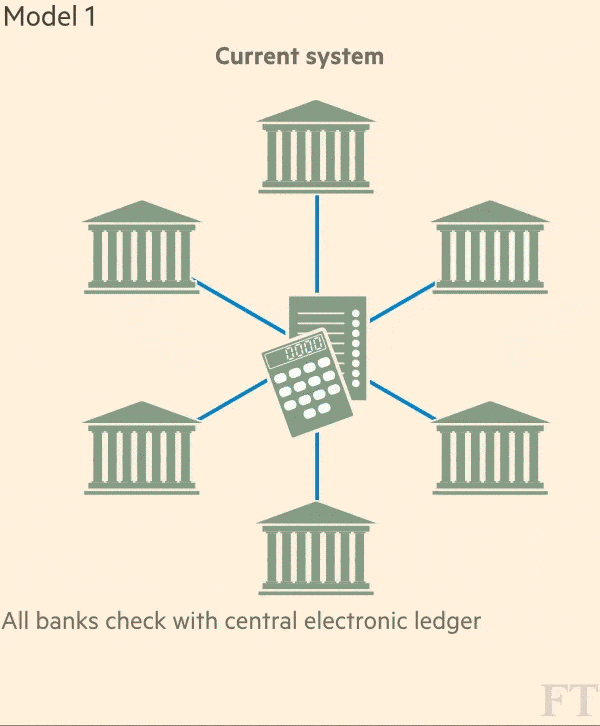
If banks don’t adapt to this digital transformation and embrace cutting-edge tools like blockchain and AI, they will risk becoming obsolete.
Now that we know why traditional banking systems require change, it is time to explore blockchain applications in the banking industry.
What Are the Different Use Cases of Blockchain in Banking?
There are various use cases of blockchain in the banking sector, revolutionizing traditional processes and paving the way for enhanced efficiency, security, and transparency. Mentioned below are some prominent uses of blockchain in banking, let us look at them in detail:
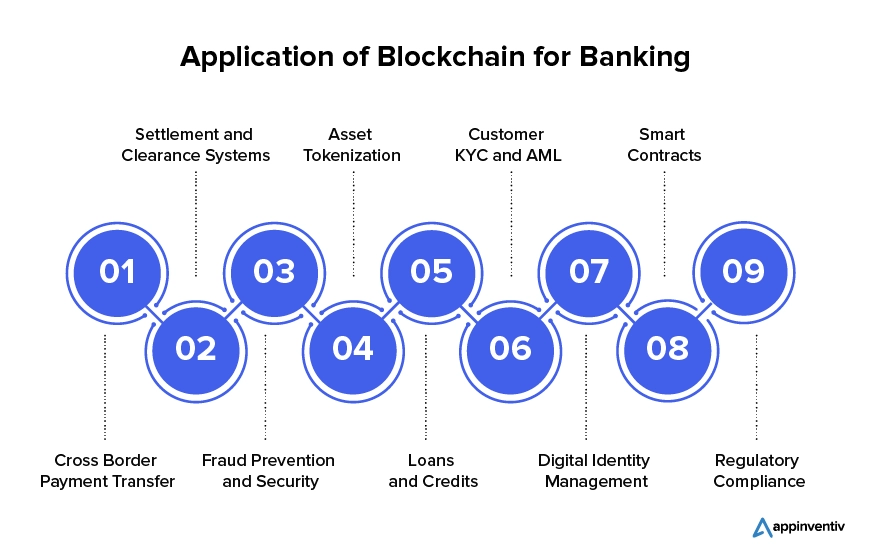
Settlement and Clearance Systems
An average bank transfer takes up to 3 days to settle a transaction. This is not just problematic for the consumers but also logistically difficult for the banks. A simple bank transfer today bypasses a complex system of intermediaries from bank to custodial service before reaching the recipient. This is where blockchain applications in banking come into the picture.
Blockchain acts as a decentralized ledger that keeps track of the transactions transparently and publicly. This means that instead of relying on custodial services, transactions can be settled in the public blockchain. This is one of the key benefits of blockchain in banking, making transactions speedy and simplified.
Cross Border Payment Transfer
Blockchain in banking and finance enables faster and cheaper cross-border transactions by eliminating intermediaries and reducing settlement times from days to minutes. Presently, trillions of dollars are wasted because of added fees and slow payments. For example, if you are in San Francisco and send money to London, both yours and the receiving bank will charge around a $25 flat fee.
We can easily eliminate these unnecessary charges using cryptocurrencies like Ether and Bitcoin, which are developed on public blockchains. The crypto payment mode is quick and easy, with no transaction fees. Moreover, since the payment happens on a decentralized network, there is no need for transaction verification, making the payment transfer faster and cheaper.
Ripple, for instance, offers a blockchain-based solution for real-time cross-border payments, allowing banks to bypass the traditional SWIFT network.
Fraud Prevention and Security
Banks have to keep track of who owns debt, stocks, or commodities in order to buy or sell them. To get this information, they connect with multiple exchanges, brokers, clearing houses, custodian banks, etc.
The involvement of these parties, combined with an outdated paper ownership system, delays the process while making it prone to inaccuracy, fraud, and data breaches. Also, the risk of technical glitches, human errors, and cyberattacks can further keep sensitive customer data at potential risk.
Financial institutions can leverage blockchain applications in banking to eliminate the layers of multiplicity and single points of failure. Since blockchain works on a single ledger system, it empowers banks to reduce the layers, minimize the room for errors, and reinforce security.
Moreover, with smart contracts, banks can swiftly detect and flag anomalies or suspicious transactions, preventing fraud and cyber theft.
Related Article: How blockchain resolves data privacy and security issues
Asset Tokenization
Blockchain applications in banking enable the tokenization of assets, such as real estate, stocks, and bonds, allowing fractional ownership and easier transferability. Banks can issue tokenized assets on blockchain platforms, facilitating faster settlement and enhancing liquidity in financial markets. Through a distributed ledger, it becomes easier to transfer assets through tokens that represent them “off-chain.”
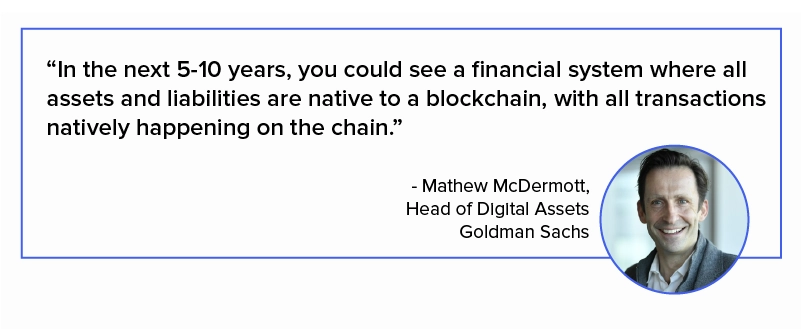
Loans and Credits
Banks tend to underwrite loans based on a credit reporting system because when a consumer applies for a loan, banks evaluate the risk they will have to suffer in case of non-payment. They make the loan approval decision by looking at the credit score, ownership status, and debt-to-income ratio. The information they get through credit reports is a centralized system that can be hostile to customers.
Blockchain in banking comes with an alternate lending system that provides an efficient, cost-effective, and secure mode of giving personal loans to customers. With a decentralized registry of payment history, it becomes easier for consumers to apply for loans and get approval.
Customer KYC
In several scenarios, banks can take up to three months to execute all the Know Your Customer (KYC) proceedings, including photo verification, address proof checks, and biometrics verification. In addition to the time it takes to verify the customers, it also costs banks a lot to perform KYC. Blockchain for banking helps ease the KYC process by creating a shared and immutable database of customer identities and transaction histories.
Banks can securely verify customer identities and track transaction trails in real time, reducing the risk of fraud and ensuring regulatory compliance. This enables banks to access information related to KYC anywhere and at any time.
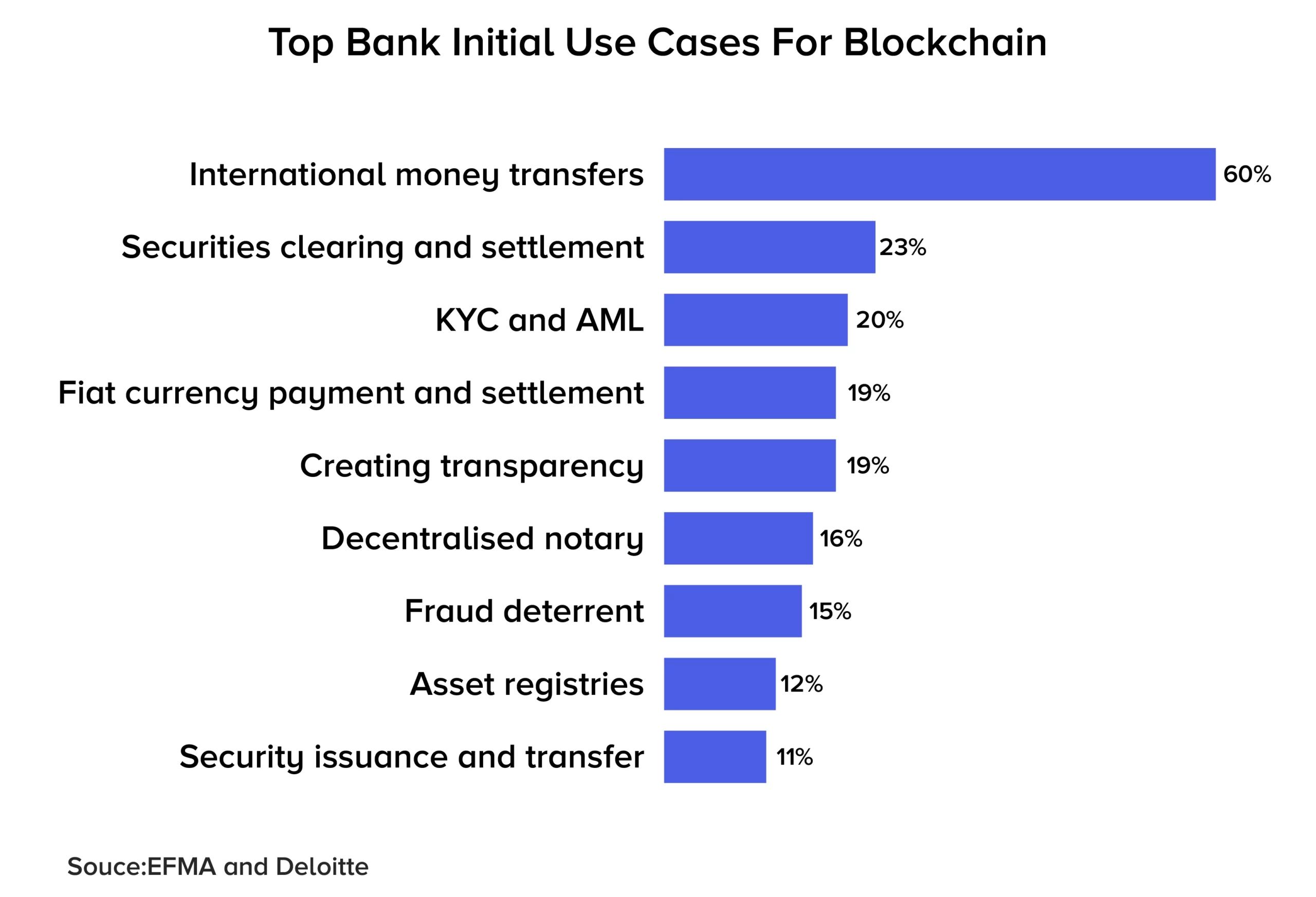
Digital Identity Management
Blockchain in banking provides a secure and decentralized framework for verifying and managing digital identities, reducing the risk of identity theft and fraud. Banks can use blockchain-based identity solutions to verify customer identities securely and share identity information across different financial institutions.
FinTech startups like Cambridge Blockchain and Tradle rely on blockchain for identity verification, which helps store data proofs and reuse the information for other banking-related operations.
Smart Contracts
Blockchain-based smart contracts automate and enforce contract terms without the intervention of intermediaries, reducing processing times and costs. With smart contracts, banks can utilize DeFi platforms for various applications, including loan agreements, insurance claims processing, and derivative contracts. DeFi platforms like Opyn and AAVE leverage smart contracts to enable sophisticated transactions like borrowing and lending.
Regulatory Compliance
The immutable nature of blockchain also enhances regulatory reporting and compliance by maintaining a tamper-proof record of transactions and regulatory data. Using blockchain, banks can automate the collection and reporting of regulatory information, reducing the burden of manual reporting and ensuring data integrity while maintaining unparalleled transparency of every transaction done on the blockchain.
Real-World Examples and Use Cases of Blockchain in Banking
Blockchain is fast acquiring momentous attention from big banking names, showcasing their interest in the technology. Let us examine some of them below.
J.P. Morgan
On 12th April 2021, J.P. Morgan stated that they use blockchain to improve money transfers. They are using the technology to lower the payment processing and verification time needed for large payments.
JPMorgan Chase has developed Quorum, an enterprise-grade blockchain platform based on Ethereum, to streamline various banking processes. Quorum has been used for applications such as interbank payments, trading, and compliance reporting.
Swedish Central Bank
The bank is experimenting with the release of its own digital currency, e-krona. Based on R3 Corda distributed technology, the bank has taken a bold step towards creating a country-wide usable cryptocurrency. This initiative aims to explore the implications of introducing a Central Bank Digital Currency (CBDC) for Sweden.
HSBC
HSBC implemented a blockchain-based trade finance platform to digitize and streamline operations. The bank is using the R3 blockchain platform to enable Digital Vault, a custody blockchain platform for storing digital assets.
This platform enables secure sharing of trade documents, such as letters of credit and invoices, among different parties involved in international trade transactions. This reduces paperwork, accelerates transaction processing, and enhances transparency.
Challenges of Blockchain Adoption in the Banking Ecosystem
While there are several advantages of embracing blockchain in banking, the road to blockchain adoption is not so easy. It is full of several risks and challenges. Here are some common challenges and the strategies to overcome them when looking to implement blockchain in banking:
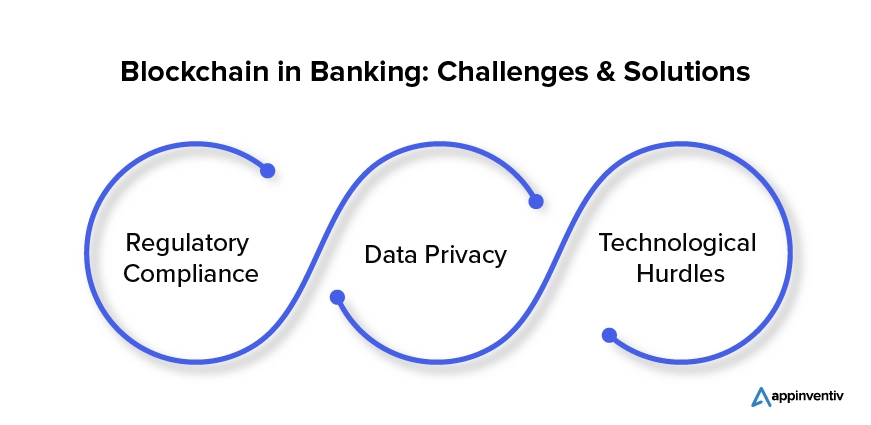
Regulatory Compliance
The regulatory landscape for blockchain in banking is complex and constantly evolving, requiring banks to carefully navigate various legal and compliance requirements, including AML and KYC regulations.
To address regulatory challenges, banks should outsource app/software development to reliable companies, establish clear guidelines for blockchain adoption, and implement robust governance frameworks that mitigate regulatory risks.
Data Privacy
While blockchain offers transparency and immutability, it also raises significant concerns about data privacy. Hacking and phishing scams, private key attacks, identity thefts, and selfish mining are the common concerns of using blockchain in the banking sector.
Banks can implement privacy-enhancing techniques such as zero-knowledge proofs or private transactions to address privacy concerns. Also, banks should prioritize data encryption, access controls, and other security measures to protect sensitive banking information.
Technological Hurdles
Blockchain faces several technological barriers that can block its adoption in the banking ecosystem. These challenges include but are not limited to scalability limitations, interoperability issues, and the complexity of integrating blockchain with existing legacy systems.
To overcome technological barriers, banks should implement efficient scalability solutions, focus on industry-wide standardization to promote interoperability, and develop robust integration practices that minimize disruption to existing banking infrastructure.
Future of Blockchain in Banking
The future of blockchain in banking is poised for significant transformation, propelling global banks and financial institutions to swiftly embrace the technology. With the growing market trend and rapid use of blockchain in banking and finance, we will witness a surge in Central Bank Digital Currencies (CBDCs), offering faster transactions and supporting financial inclusion.
Furthermore, enhanced security features like zero-knowledge proofs and smart contracts will protect customers’ data and transactions, maintaining compliance with industry regulations like GDPR and PCI-DSS.
Additionally, the emergence of decentralized finance (DeFi) platforms, blockchain wallets, and asset tokenization will open new avenues for liquidity and investment opportunities, urging banks to adapt and propel towards innovation, efficiency, and greater financial accessibility.
Also Read: Blockchain Technology: All Set To Revamp the Future of Transactions
Elevate Your Blockchain in Banking Journey with Appinventiv
Undeniably, blockchain in banking and finance is bringing many innovations in the sector, such as lowered transaction costs, expedited transaction processing, better data verification, and so on.
However, to leverage the maximum potential of blockchain for finance, banks need to outsource a reputed blockchain development company. A company that best understands the multi-faceted approach of integrating the new-gen technology in the banking domain.
Appinventiv is a leading provider of blockchain financial services, offering custom and secure solutions to elevate your digital transformation journey. Whether you are a huge enterprise looking to automate business or an aspiring entrepreneur just starting a venture, our comprehensive suite of blockchain development services is for everyone, which includes:
- Blockchain Consulting
- dApps Development
- Polygon Development
- Smart Contract Development
- Custom Blockchain Development
- Asset Tokenization Platform Development
- Crypto Wallet Development
- NFT Marketplace Development
- ICO Development
- Solidity Development
Get access to our dedicated team of 1500+ tech evangelists who specialize in delivering impeccable blockchain solutions tailored to your specific business requirements.
FAQs
Q. How can blockchain applications redefine the banking process?
A. Blockchain applications can redefine the entire banking process with its decentralized digital ledger system that records transactions across multiple computers in a secure and transparent manner. Each transaction is encrypted and linked to the previous one, forming a chain of blocks.
Blockchain for banking enables faster and more secure transactions, reduces costs by eliminating intermediaries, enhances transparency, and facilitates innovation through its various applications.
In short, blockchain and banking go hand in hand in today’s digitalized world, revolutionizing traditional banking processes for enhanced efficiency, security, and customer experience.
Q. How can blockchain make the banking industry more secure?
A. Blockchain technology can enhance security in the banking industry through its fundamental characteristics, including decentralization, transparency, immutability, and cryptographic encryption. For instance:
- Each block in the chain contains a cryptographic hash of the previous block, creating a tamper-proof record of all transactions, which provides a high level of security against data manipulation.
- Decentralized architecture makes it difficult for malicious actors to manipulate or compromise the system.
- The consensus mechanism and distributed ledger ensure data consistency across the network.
- The transparency feature ensures that any suspicious activity is detected in real-time, reducing the risk of fraud and unauthorized transactions.
- The cryptographic encryption used in blockchain technology protects sensitive data, reducing the risk of fraud, data breaches, and cyberattacks.
Q. What are the benefits of implementing blockchain technology in banking?
A. Implementing blockchain technology in banking offers a myriad of benefits that can significantly revolutionize the entire industry. Some of the most remarkable benefits of blockchain in banking are:
- Enhanced Security: Blockchain’s decentralized and immutable ledger ensures that transactions are secure and tamper-proof.
- Improved Transparency: Every transaction recorded on the blockchain is transparent and visible to all participants in the network.
- Faster and Cost-Effective Transactions: Blockchain enables faster and more cost-effective transactions by eliminating intermediaries and streamlining processes.
- Increased Efficiency: Automation through smart contracts and decentralized applications (dApps) helps improve efficiency, reduce the risk of manual errors, and accelerate transaction processing times.
- Enhanced Regulatory Compliance: Blockchain facilitates easy adherence to regulatory standards and compliance by providing a transparent and auditable record of all transactions.
- Innovative Solutions: Blockchain technology enables banks to develop innovative products, such as asset tokenization, peer-to-peer lending platforms, and decentralized finance (DeFi) solutions.
These offerings help improve the customer experience, drive revenue growth, and gain competitive advantage in the industry.
![]()
THE AUTHOR
chirag
Blockchain Evangelist
Fuente
Tech
Hollywood.ai by FAME King Sheeraz Hasan Promulgates a Complete Ecosystem that Unites Web3, Cryptography, AI and Entertainment for Spectacular Global Tech Innovation

The one and only FAME King Sheeraz Hasan is launching Hollywood.ai, a revolutionary platform designed to integrate the cutting-edge realms of Web3, cryptocurrency, AI, finance and entertainment. This revolutionary initiative is set to create a seamless, interactive and intuitive ecosystem where the world’s leading technology luminaries can collaborate on innovations, ultimately redefining the future of digital interaction.
Hollywood.ai represents the convergence of the most complex technologies of all time. Fusing Web3 principles, cryptocurrency utilities, AI advances, and financial machinery, Sheeraz’s platform aims to become the nucleus for innovation and modernization. It provides a high-tech environment where technology and creativity collide harmoniously, paving the way for new paths in the digital economy.
A defining feature of Hollywood.ai is the integration of cryptocurrency into the AI ecosystem, transforming AI into a tokenized asset with full cryptographic utility. Sheeraz’s novel approach presents new avenues to leverage the myriad capabilities of AI in the financial realm, unlocking unprecedented opportunities for developers and users alike. Through the amalgamation of AI and cryptocurrency, Hollywood.ai is paving the way for an incredibly interconnected digital space unlike anything seen before.
The platform’s design emphasizes the undeniable symbiosis between various technology sectors. Under Sheeraz’s careful orchestration, Web3 technologies facilitate decentralized collaboration, while AI tools offer enhanced potential for data analytics, content creation, and audience engagement. Additionally, the inclusion of financial innovations ensures rapid mobility of both monetization and investments, providing a holistic environment that meets the ever-evolving demands of the technology and entertainment segments.
Sheeraz’s Hollywood.ai is poised to become the premier hub for industry leaders, developers, and creators to support and empower the next generation of digital experiences. This initiative aspires to drive the emergence of new tools, applications, and services that set new standards for advanced engagement and interaction.
Known for making the impossible possible, Sheeraz envisions a future where global audiences actively participate in designing the next A-list stars from scratch. Hollywood.ai will allow users to watch their creations evolve from simple concepts to 3D talents that can act, sing and perform just like human actors.
The Hollywood.ai platform leverages AI technology to deliver personalized fan engagement, real-time sentiment analysis, and informed content creation. By combining cutting-edge AI capabilities with Sheeraz’s deep understanding of celebrity branding, Hollywood.ai gains immense control over public figures.
Undeniably, FAME’s number one strategist Sheeraz Hasan continues to cement his reputation as a pioneer in the fields of FAME and technology. The power and influence of this latest development brings him closer to total world domination.
Tech
Online Broker Futu Offers Cryptocurrency Trading in Hong Kong, With Nvidia and Alibaba Stock as Rewards

Futu Securities International, Hong Kong’s largest online broker, has launched retail cryptocurrency trading in the city, offering shares of Alibaba Holding Group AND Nvidia as a reward in an attempt to attract investors. Futu has begun allowing Hong Kong residents to trade Bitcoin and ether, the world’s two largest cryptocurrencies, directly on the brokerage platform using Hong Kong or U.S. dollars, the company announced Thursday.
The online retail broker said last month that it had received an upgrade to its securities license from the Securities and Futures Commission (SFC), allowing Futu to offer virtual asset trading services to both professional and retail clients in the city.
Futu’s move comes as Hong Kong seeks to boost its attractiveness as a business hub for virtual assets, with the city government launching a series of new cryptocurrency policy initiatives over the past two years, including a mandatory licensing regime for cryptocurrency exchanges.
In addition to offering cryptocurrency trading on its flagship brokerage app, Futu is also seeking a cryptocurrency trading license for its new PantherTrade platform. That platform is among 11 in Hong Kong that are currently “deemed licensed” for cryptocurrency trading, an arrangement that allows them to operate in the city while they await full approval from the SFC.
Hong Kong’s progress in becoming a crypto hub has encountered various challenges, including exit of the major global platforms and relatively low trading activity for cryptocurrency exchange-traded funds offered on local stock exchanges.
Futu is now offering a series of incentives to potential investors, amid a cryptocurrency bull market that has seen the price of bitcoin rise 45 percent this year.
Hong Kong investors who open accounts in August and deposit HK$10,000 (US$1,280) over the next 60 days can receive HK$600 worth of bitcoin, a HK$400 supermarket voucher or a single Chinese stock. e-commerce giant Alibaba. Alibaba owns the South China Morning Post.
By holding 80,000 U.S. dollars for the same period, users can get 1,000 Hong Kong dollars in bitcoin or a share of U.S. artificial intelligence (AI) chip maker Nvidia, whose shares have risen more than 140 percent this year.
A Futu representative said the brokerage firm will also waive cryptocurrency trading fees starting Thursday until further notice.
Futu is the first online brokerage in Hong Kong to allow retail investors to buy cryptocurrency directly on its platform. SFC rules require it to offer this service through a tie-up with a licensed cryptocurrency exchange. Futu is partnering with HashKey Exchange, one of only two licensed exchanges in Hong Kong, according to the representative.
Futu’s local rival Tiger Brokers also said in May that it had begun offering cryptocurrency trading services to professional investors on its platform following a license update. The SFC defines professional investors as those with more than HK$8 million in their investment portfolios or corporate entities with assets exceeding HK$40 million.
Tech
Tech Crash: $2.6 Trillion Market Cap Vanishes as ‘Magnificent 7’ Prices Stumble

A group of seven megacap tech stocks, often called the Magnificent 7, have lost more than $2.6 trillion in value over the past 20 days, or an average of $125 billion per day over the period. In total, these stocks have lost “three times the value of the entire Brazilian stock market.”
This according to the economic news agency Letter from Kobeissiwho noted on the microblogging platform X (formerly known as Twitter) that the Magnificent 7 batch “is worth as much as Nvidia’s entire current market cap in 20 days,” with Nvidia itself having lost $1 trillion from its high.
Source:Letter from Kobeissi on the X
The group, which includes Nvidia, Microsoft, Amazon, Apple, Alphabet, Meta and Tesla, has undergone a significant correction: in the last 20 days Nvidia has lost 23% of its value, or about $800 billion, while Tesla has fallen 19%, losing $164 billion.
Microsoft, Apple, Amazon, Alphabet and Meta all posted losses of between 9% and 15%, losing between $257 billion and $554 billion in market capitalization, wiping out a total of $200 billion more “than every single German stock market tock combined.”
Tech titans, which have outperformed the broader S&P 500 index since the market bottom of 2022, are now facing a reckoning as investors grow increasingly wary about the sustainability of their meteoric rise, with Nvidia taking the lead soaring 110% since the beginning of the year and over 2,300% in the last five years.
Earnings reports from these companies, starting with Microsoft and culminating with Nvidia in late August, will be closely watched for signs of weakness. Their performance could set the tone for broader market sentiment, with implications for everything from cryptocurrency to other high-risk assets.
Their poor performance comes after a leading macroeconomist, Henrik Zeberg, reiterated his forecast of an impending recession that will be preceded by a final wave in key sectors of the market, but which can potentially be the worst the market has seen since 1929the worst bear market in Wall Street history.
In particular, the Hindenburg Omen, a technical indicator designed to identify potential stock market crashes, began flashing just a month after its previous signal, raising concerns about a possible impending stock market downturn.
The indicator compares the percentage of stocks hitting new 52-week highs and lows to a specific threshold. When the number of stocks hitting both extremes exceeds a certain level, the indicator is said to be triggered, suggesting a greater risk of a crash.
Featured Image via Disinfect.
Tech
Trump Fights for Cryptocurrency Vote at Bitcoin Conference

To the Bitcoin Conference 2024 In Nashville, Tennessee, former President Donald Trump delivered a keynote speech.
Trump, the Republican presidential candidate, used the platform to appeal to the tech community and solicit donations for the campaign. During the conference, He said:
I promise the Bitcoin community that the day I take the oath of office, Joe Biden and Kamala Harris’ anti-crypto crusade will be over… If we don’t embrace cryptocurrency and Bitcoin technology, China will, other countries will. They will dominate, and we can’t let China dominate. They are making too much progress as it is.
Trump’s speech focused heavily on cryptocurrency policy, positioning it as a partisan issue. He said that if reelected, he would fire SEC Chairman Gary Gensler on his first day in office, a statement that drew enthusiastic applause from the audience. This statement marked a stark contrast to Gensler’s tenure, which has been characterized by rigorous oversight of the cryptocurrency industry.
The former president outlined several pro-crypto initiatives he would undertake if elected. These include transforming the United States into a global cryptocurrency hub, keeping all government-held Bitcoin as a “national Bitcoin reserve,” establishing a presidential advisory council on Bitcoin and cryptocurrency, and developing power plants to support cryptocurrency mining, emphasizing the use of fossil fuels.
Trump’s current embrace of cryptocurrencies represents a reversal from his stance in 2021, when described Bitcoin as a “scam against the dollar.” He also noted that his campaign has received $25 million in donations since accepting cryptocurrency payments two months ago.
The event featured other political figures, including Republican Senators Tim Scott and Tommy Tuberville, as well as Democratic Representatives Wiley Nickel and Ro Khanna. Independent presidential candidate Robert F. Kennedy Jr. also spoke at the conference.
Trump’s appearance at Bitcoin 2024 reflects growing support for his campaign from some tech leaders, including Tesla CEO Elon Musk and cryptocurrency entrepreneurs Cameron and Tyler Winklevoss.
While Trump has described the current administration as “anti-crypto,” Democratic Congressman Wiley Nickel said Vice President Kamala Harris is taking a “forward-thinking approach to digital assets and blockchain technology.”
This event underscores the growing political importance of cryptocurrency policy in the upcoming presidential election.
Kamala Harris and Democrats Respond on Cryptocurrencies
In a strategic move to repair strained relations, Vice President Kamala Harris’ team has initiated a dialogue with major cryptocurrency industry players. This outreach aims to restore the Democratic Party’s stance on digital assets and promote a more collaborative approach.
THE Financial Times reports that Harris’s advisors have reached out to representatives from industry leaders like Coinbase, Circle, and Ripple Labs. This move comes as the cryptocurrency community increasingly supports Republican candidate Donald Trump, reflecting growing dissatisfaction with the current administration’s cryptocurrency policies.
THE disclosure follows a letter from Democratic lawmakers and 2024 candidates urging the party to reevaluate its approach to digital assets. Harris’s team stresses that this effort is less about securing campaign contributions and more about engaging in constructive dialogue to develop sensible regulations.
The move is part of a broader strategy to reshape the Democratic Party’s image among business leaders, countering perceptions of an anti-business stance. Harris’ campaign aims to project a “pro-business, responsible business” message.
-

 Videos12 months ago
Videos12 months agoCrypto News: Bitcoin, ETH Price, CPI Print, PYTH, WIF & MORE!!
-

 Videos11 months ago
Videos11 months agoCrypto News: Bitcoin Price, ETF, ETH, WIF, HNT & MORE!!
-
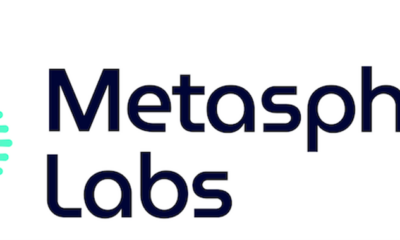
 DeFi11 months ago
DeFi11 months agoMetasphere Labs announces follow-up event regarding
-

 Videos12 months ago
Videos12 months agoSolana price potential?! Check out THIS update if you own SOL!!
-

 DeFi8 months ago
DeFi8 months agoPump.Fun Overtakes Ethereum in Daily Revenue: A New Leader in DeFi
-

 News8 months ago
News8 months agoNew bill pushes Department of Veterans Affairs to examine how blockchain can improve its work
-

 DeFi8 months ago
DeFi8 months agoDegens Can Now Create Memecoins From Tweets
-

 News8 months ago
News8 months agoLawmakers, regulators to study impact of blockchain and cryptocurrency in Alabama • Alabama Reflector
-

 Bitcoin8 months ago
Bitcoin8 months ago1 Top Cryptocurrency That Could Surge Over 4,300%, According to This Wall Street Firm
-

 Videos11 months ago
Videos11 months agoWho Really CONTROLS THE MARKETS!! Her plans REVEALED!!
-

 Ethereum11 months ago
Ethereum11 months agoComment deux frères auraient dérobé 25 millions de dollars lors d’un braquage d’Ethereum de 12 secondes • The Register
-

 Videos11 months ago
Videos11 months agoCryptocurrency News: BTC Rally, ETH, SOL, FTM, USDT Recover & MORE!






